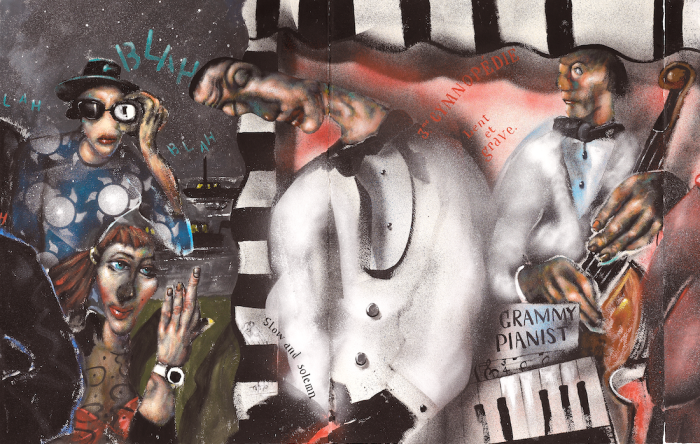BY TERESE LOEB KREUZER
Two plays set by their English playwrights centuries ago in Italy sailed into Lower Manhattan last week, both with money, or its absence, as the fulcrum of the plot and both with feisty heroines subjected to male caprice.
The Merchant of Venice
Shakespeare’s “The Merchant of Venice,” first published in 1600, perplexes modern audiences, who don’t know how to react to the Jewish moneylender, Shylock, described on the title page of the first quarto as a man of “extreme crueltie.” The production at Pace University’s Michael Schimmel Center for the Arts through March 13 stars F. Murray Abraham as Shylock — cursed and degraded by his Christian neighbors, but necessary to them as a source of funds.
Though Shylock looms over the play (considered one of Shakespeare’s “comedies”), he is only present in five of the 18 scenes. Much of the plot is devoted to the witty heiress, Portia, first seen fending off unwelcome suitors, then falling for a handsome lad named Bassanio, and then defending Bassanio’s friend and patron, Antonio, from Shylock’s murderous rage in the famous courtroom scene. (The latter is the merchant of Venice, who was unable to pay a debt to Shylock, incurred on Bassanio’s behalf.)
Updated by director Darko Tresnjak to “the near future,” this Theatre for a New Audience production suggests Wall Street. The men wear business suits; the women are attired in chic dresses and high heels. The set is metallic and spare, with computer screens showing stock prices and other plot elements. The characters talk on cell phones.
If this was meant to make the play seem more relevant to a contemporary audience, the effort was superfluous. Shakespeare has written a fairy tale — the story of a fair maiden, her suitors and the riddle of the three caskets — embedded in a timeless psychological drama.
It’s a story about love (including Antonio’s for Bassanio, which has homosexual overtones), financial greed, parent-child relationships, cruelty, humiliation, rage, revenge and servitude. It’s also a story about anti-Semitism and other prejudices.
In Shakespeare’s time, Jews had been banished from England for more than three centuries; it’s likely that neither he nor anyone in his audience knew a Jew. Shakespeare’s audience would have had no sympathy for Shylock, who they would have seen as some characters in the play do, as a “dog,” an “infidel,” a “villain” and the devil himself. Shakespeare saw that Shylock’s rage stemmed from humiliation and gave him an eloquent plea for compassion and tolerance, offering Abraham an opportunity to depict both sides of this complex character — his shrewdness, his greed and his anguish and despair. It is a memorable performance.
The surrounding cast is excellent. Kate MacCluggage is lovely as Portia. Christen Simon Marabate is charming as her waiting woman, Nerissa. Jacob Ming-Trent is droll as Launcelot Gobbo, first servant to Shylock and then to Bassanio. The lovers, Lorenzo and Jessica, Shylock’s daughter, are well played by Vince Nappo and Melissa Miller.
“The Merchant of Venice” has some of Shakespeare’s most beautiful language — not only Portia’s famous “the quality of mercy is not strained” speech but speeches less often quoted, given to Lorenzo and Jessica, as they (in this updated production) make love in fragrant gardens on a moonlit night. “Sit, Jessica,” Lorenzo says. “Look how the floor of heaven/Is thick inlaid with patines of bright gold;/There’s not the smallest orb which thou behold’st/But in his motion like an angel sings,/Still quiring to the young-ey’d cherubims:/Such harmony is in immortal souls;/But, whilst this muddy vesture of decay/Doth grossly close it in, we cannot hear it.”
If Shylock is a “villain,” he is not the play’s only one. No one in the play is devoid of muddied motives and actions — but there is no one in the play that Shakespeare does not understand and forgive.
The Rover
“The Rover” by Aphra Behn, the first professional woman playwright in England, dates from 1677, and revolves around two sisters, Florinda and Hellena, whose brother, Don Pedro, wants to “care” for them by marrying Florinda off to his wealthy friend, Don Antonio, despite her love for the poor English captain, Belvile, and by sending Hellena to a convent. The girls have other ideas and persuade their chaperone to let them don masks and seek fun and mischief in Naples’ pre-Lenten carnival. Flirtations, sword fights, assignations and a near rape ensue, with the requisite happy ending of marriages for almost all.
The Restoration comedy is being given an energetic production by New York Classical Theatre at the World Financial Center in Battery Park City. The actors move through various spaces in the building, with the audience following them as the scenes unfold. Originally in five acts and lasting three to four hours, “The Rover” has been abridged to around 80 minutes.
“I focused it down to issues of women’s independence, which was really at the core of the play,” said New York Classical Theatre’s founder and artistic director, Stephen Burdman. “Aphra Behn was writing in a time of strictly male playwrights. Like Queen Elizabeth, she was a woman much ahead of her time.”
Not much is known about Behn’s life, but what little is known is extraordinary. She was born in 1640 in Canterbury, England, was “designed for a nun,” lived in Surinam (a Dutch colony in South America) from 1663 to 1664, married and was widowed after two years, worked in Antwerp as a spy for King Charles II, was thrown into debtor’s prison, and when she emerged, abandoned espionage for the theater. She wrote numerous plays and several collections of poetry as well as prose. She died in 1689 and was buried in Westminster Abbey.
The spirited sisters, Florinda and Hellena, seem to be an apt reflection of their author. Engagingly played by Kersti Bryan (Florinda) and April Sweeney (Hellena), they literally have to run for their lives with their despotic brother (Jorge Alberto Rubio) in pursuit, but they manage to get what they want in the end. It isn’t clear, however, whether the men of their choice will bring them much happiness. Florinda’s love, Belvile (well-played by Cooper D’Ambrose), is weak and Hellena’s beloved, Willmore (the “rover” of the title played by the seductive M. Scott McLean), is a charming womanizer. In fact, none of the men in the play comes off particularly well. They are quarrelsome, capricious, misogynistic and as ready to rape a woman as to woo her.
The production, however, comes off very well. The gorgeous costumes are in toothsome shades of salmon, burgundy and cherry red (for the beautiful courtesan, Angellica Bianca, played by Vanessa Morosco). The director, Karin Coonrod, has made an inventive use of the World Financial Center’s varied spaces, and a trio of musicians led by Sarah Stephens on violin acts as a sort of chorus, commenting musically on the action and helping to shepherd the audience from place to place.
New York Classical Theatre has two more productions scheduled for this season: Molière’s “School for Husbands,” which will be performed in Central Park from June 2 through June 26, and Shakespeare’s “Henry V,” which will be performed in July in Battery Park and on Governors Island.
“The Rover,” produced by New York Classical Theatre and by Arts World Financial Center, will be at the World Financial Center in Battery Park City through March 20.
“The Merchant of Venice” is at Pace University’s Michael Schimmel Center for the Arts through March 13 before beginning a national tour.
































